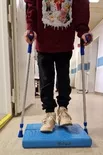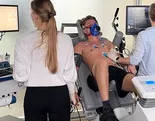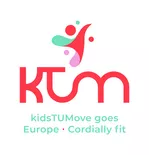Prehab Exercise and Bone Tumor
Influence of a prehabilitative exercise intervention on structural and functional parameters in children and adolescents with a bone tumor

This project is investigating the extent to which an individualized training program during neoadjuvant chemotherapy can reduce degradation processes of musculoskeletal structures and the associated functional limitations during and after acute therapy for the treatment of bone tumors in children and adolescents. The aim is to create the best possible initial muscular situation and reduce physical impairments as successfully as possible as part of prehabilitation prior to surgical local therapy in the treatment of a bone tumor. Cooperation partners: Pediatric Hematology, Oncology and Stem Cell Transplantation, Center for Pediatric and Adolescent Medicine, Department of Clinical Medicine, TUM School of Medicine and Health and Oncological Day Clinic of the Children's Oncology Center at the CCC Munich of Ludwig-Maximilians-University
Project Website: Kinderklinik Schwabing
Funding: Initiative krebskranke Kinder München e.V.
Plan‘eat
Changing an established therapy program to a plant-based diet for adolescents and its effects on vascular health.

The Plan'eat project aims to shift the food system towards sustainability and health by understanding eating behaviors and assessing current nutritional impacts. It will develop action recommendations for healthier, sustainable diets. The Chair of Preventive Pediatrics is involved as a living lab, studying how a plant-based diet affects cardiovascular risk in obese adolescents. Examining microcirculation, arterial stiffness, and the microbiome before and after a rehab stay at the Gaißach Clinic. The control group gets standard therapy, while the intervention group switches to a primarily plant-based diet.
Project Webpage: planeat-project.eu
Funding: European Union’s Horizon Europe Research and Innovation programme (Grant agreement ID: 101061023)
Virtual Health - KIJANI
Children & young people: active, nature-conscious, innovative in Munich

The "KIJANI" project focuses on promoting the health of children and young people by developing digital exercise programs that combine indoor and outdoor sports with digital gaming experiences. The aim is to increase physical activity among young people through the use of gamification, augmented reality, live challenges and movement coaches. The term "KIJANI" stands for innovation and the promotion of an active and sustainable lifestyle, symbolized by a virtual game character. The name, which means "green" in Swahili, emphasizes the connection to nature and sustainability. The project has links to the cooperation partner "WALKI-MUC" and its activities in the green space.
Funding: State of Bavaria - Gesund.Leben.Bayern.
Cardiac Function after Childhood Cancer Therapy
Early Detection of Cardiac Functional Impairments Following Potentially Cardiotoxic Cancer Therapy in Childhood and Adolescence – A Feasibility Study

Cardiovascular late effects after childhood cancer are problematic and can significantly impair the quality of life and health of those affected. The early detection of subclinical changes in cardiac function is hardly possible with conventional diagnostic methods, but can be successful under physical stress. In this project, cardiac function in 10-25-year-olds in the first and fifth year after the end of therapy will be examined using stress echocardiography and spiroergometry in comparison with healthy control subjects. Cooperation partners: Pediatric Hematology, Oncology and Stem Cell Transplantation, Center for Pediatric and Adolescent Medicine, Department of Clinical Medicine, TUM School of Medicine and Health and Oncological Day Clinic of the Children's Oncology Center at the CCC Munich of the Ludwig-Maximilians-University
Project Webpage: Paediatrische-sportmedizin
Fundimg: Deutsche Herzstiftung e.V.
TENSIONED - Holistic health in focus
Exercise, fitness, stress, sleep and blood vessels - For a strong future for adults with congenital heart defects

This study includes stress, exercise, sleep, physical fitness and the vascular status of the patients. Activity, stress and sleep are measured over seven days using wearable technology - watches that make it possible to collect large amounts of data around the clock and evaluate it pseudonymously. We hope that these technical possibilities will enable us to make precise statements about the three parameters and also provide important conclusions about the fitness and vascular structures of these patients
Funding: Fördergemeinschaft Deutsche Kinderherzzentren e.V.
kidsTUMove goes Europe – cordially fit
Empowering Chronically Ill Children and Adolescents Through Sports

The project aims to provide children and adolescents with chronic diseases or post-traumatic stress disorder with access to sports programs and physical activity. The project is funded by the EU until June 2025. Our chair is coordinating the consortium. The partnership includes universities and organizations from Greece, Italy, Spain and Portugal. In cooperation, a training manual for exercise instructors will be developed to train affected persons in a professional and sustainable way. In addition, the establishment of an online platform will make information and sports programs easily accessible to all groups of the European population and build a network of health experts. For more information, visit the project website or the social channels of KTM goes Europe - cordially fit.
Facebook: KTM - kidstumove goes Europe, Instagram: ktm_kidstumove, X: @kidsTUMoveEU
Funding: European Union - ERASMUS+
MuCAYA+
Munich Cardiovascular Adaptation in Young Athletes Study
Competitive sports in childhood and adolescence often require weekly training loads of 10-20 hours, far exceeding the WHO recommended 60 minutes of daily physical activity. This can negatively impact the cardiovascular system, similar to adult athletes. Therefore, early monitoring of cardiovascular health in young athletes is of great importance.
The MuCAYA+ study is a project funded by the DFG, which over three years explores the effects of intense physical activity on children and adolescents. Annually, 250 young athletes are examined in the sports medicine outpatient clinic to analyze the relationship between cardiovascular adaptations, exercise and performance, body composition, eating habits and biochemical factors.
Project Website: Mucaya+
Funding: Deutsche Forschungsgemeinschaft: DFG
FIT4LIFE
A digital intervention project for young families to prevent overweight and obesity

The "FIT4LIFE" program is a digital intervention for young families from Munich with the primary goal of supporting the promotion of a healthy lifestyle. The focus is on counteracting the prevalence of overweight and obesity, which are considered significant public health problems and have been identified as precursors to cardiovascular disease. Using an interdisciplinary approach, this program is based on a digital intervention that addresses typical behavioral patterns that could lead to an unhealthy lifestyle. The early intervention timing is also intended to raise awareness of important health issues for the child and to provide networking with competent support in case of problems.
Funding: Friedrich Schiedel-Stiftung
Digital Health Nudging
Can daily text messages on smartphones increase exercise behavior in adolescents with congenital heart disease?

The intervention group of patients with a congenital heart defect will be encouraged to be physically active over a period of three months by means of nudging - digital text or picture messages sent to a smartphone. In this way, we hope that the intervention group will remain more active over the observation period of three months than a control group. Through so-called "nudging" - a nudge via digital text or picture messages on the smartphone - the intervention group with patients with congenital heart defects will be encouraged to be physically active over a period of three months. In this way, we hope that this intervention group will remain more active over the observation period of three months than a control group.
Funding: Stiftung KinderHerz
Footloose
Development of sports motor skills, vascular stiffness and quality of life in children and adolescents with congenital heart defects in longitudinal section

The project is designed as a longitudinal study and investigates how sports motor skills, vascular stiffness and quality of life develop during childhood and puberty. We have been investigating these so-called functional parameters since 2014 and are aiming for a 10-year follow-up study.
Funding: Fördergemeinschaft Deutsche Kinderherzzentren e.V.
Connect2Move
Utilization of natural cardio hiking trails through open innovation for the sustainable promotion of intergenerational, health-oriented tourism

The aim of the project is to valorize natural and evidence-based cardio-trekking trails through open innovation methods for the sustainable promotion of intergenerational, health-oriented tourism. With special consideration of the Alpine region, including its cultural heritage (e.g. ecomodel region (D), mountaineering villages (D), Roman region (D), alpine and high-altitude trails (AT)), existing hiking trails are to be designed into themed trails and digitally remapped, in which the cardiovascular exercise intensities are also marked in addition to the usual description of length, altitude, trail characteristics and duration.
Project Website: Connect2Move
TUM4Health
Student health management

The project is about setting up a student health management system at TUM. The project is financed and supported by the Techniker Krankenkasse for 5 years. A holistic and scientific approach is chosen, which includes medical examinations as well as classic measures in the field of prevention, namely: exercise, nutrition, stress and addiction. The measures are based on the analysis of students' real problems.
Project Webiste: TUM4Health